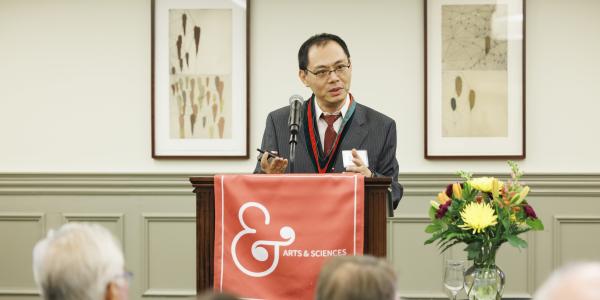Li Yang, the Albert Gordon Hill Professor of Physics, delivered an address titled “Exploring Quantum Mechanics at Nanoscale with Petascale Computing.”

On Nov. 7, Li Yang was installed as the Albert Gordon Hill Professor of Physics. The program included a welcome from Feng Sheng Hu, the Richard G. Engelsmann Dean of Arts & Sciences and Lucille P. Markey Distinguished Professor; an introduction by Henric Krawczynski, the Wilfred R. and Ann Lee Konneker Distinguished Professor of Physics; and the installation and medallion presentation by Dean Hu.
In his remarks, Yang described density functional theory, a Nobel Prize-winning breakthrough by Austrian chemist Walter Kohn that made it possible to calculate the interactions between electrons in a material. “It’s a universal equation that we can use to study all kinds of materials,” he said. Yang's team at WashU harnesses this basic idea to search for and create new materials, including substances with interesting quantum properties. “With petascale computing power, we can atomically design new structures never realized in the lab,” Yang said. “We combine powerful simulations with novel materials to predict and understand new quantum phenomena.”
Yang thanked his students and postdoctoral researchers for their hard work and passion for physics. “Without them, none of this would be possible.”
About Li Yang
Li Yang earned a bachelor’s degree in material physics and a master’s degree in statistical physics at Beijing Normal University. Drawn to the interdisciplinary nature of physics, he ventured to the U.S. to pursue his doctoral degree in physics at the Georgia Institute of Technology. During his doctoral studies, Yang explored diverse areas, including biophysics, nonlinear dynamics, and analog circuit design. Ultimately, he developed a passion for materials research, leading to a focus on uncovering the secrets of novel materials with groundbreaking properties. Recognizing the crucial role of theory and computation in understanding and predicting material properties, Yang joined Professor Mei-Yin Chou’s group at Georgia Tech. There, he began exploring the interactions between light and nanostructures. To further his expertise in computational physics, Yang sought guidance from Professor Steven Louie’s and Professor Marvin Cohen’s group at the University of California, Berkeley, during his postdoctoral research in 2006.
In 2009, Yang joined the faculty at WashU. Empowered by the exceptional contributions of his students, postdoctoral researchers, and colleagues, the scope of his research expanded significantly. The Yang Lab now investigates a wide range of quantum material properties, including optical properties, electronic behavior, magnetism, multiferroic effects, and the potential applications of quantum sensing in semiconductors. This diverse research program thrives on an interdisciplinary approach where Yang fosters an environment that welcomes and encourages various perspectives and backgrounds.
Yang has published more than 120 peer-reviewed articles with more than 23,000 citations. In 2015, he received a National Science Foundation CAREER Award. His prediction on many-electron excitations and optical properties of two-dimensional semiconductors was selected for the collection of “Physical Review B 50th Anniversary Milestones” by the American Physical Society.
Beyond his research, Yang cherishes time with his wife, Jing Yu, and their two daughters, Renae and Nicole. Together, they enjoy cooking, hiking, and occasionally indulging in basement karaoke.
About Albert Gordon Hill
The Albert Gordon Hill Professorship in Physics was established in 1997 thanks to a generous bequest from Dr. Hill, who earned a bachelor of science in mechanical engineering and a master of science in physics from WashU in the early 1930s. He received his doctorate in physics from the University of Rochester. Hill began his career at the Massachusetts Institute of Technology in 1937, rising from physics instructor to professor emeritus in his 47 years there. He was director of MIT’s Research Laboratory of Electronics, which developed radar for use in World War II, and served as chairman of the board of the Charles Stark Draper Laboratory, which was concerned with space exploration and defense research.
Hill has been described as a man of vision with a strong belief in political and intellectual freedom, both of which he defended and advocated for throughout his career in government service and academia. He was honored with several awards for his service to the United States, including the Presidential Certificate of Merit (1948), the Air Force Civilian Distinguished Service Award (1955), and the Secretary of Defense Meritorious Civilian Service Award (1959).
Hill was awarded the Washington University Distinguished Alumni award in 1955. His association with the university has deep roots; his grandmother’s uncle, Wayman Crow, was responsible for the founding of WashU alongside William Greenleaf Eliot.





